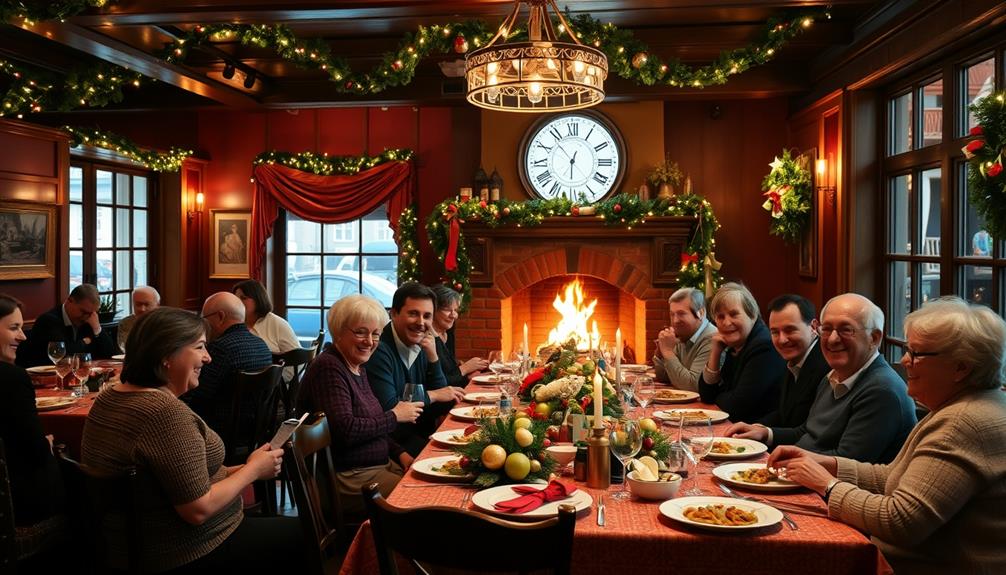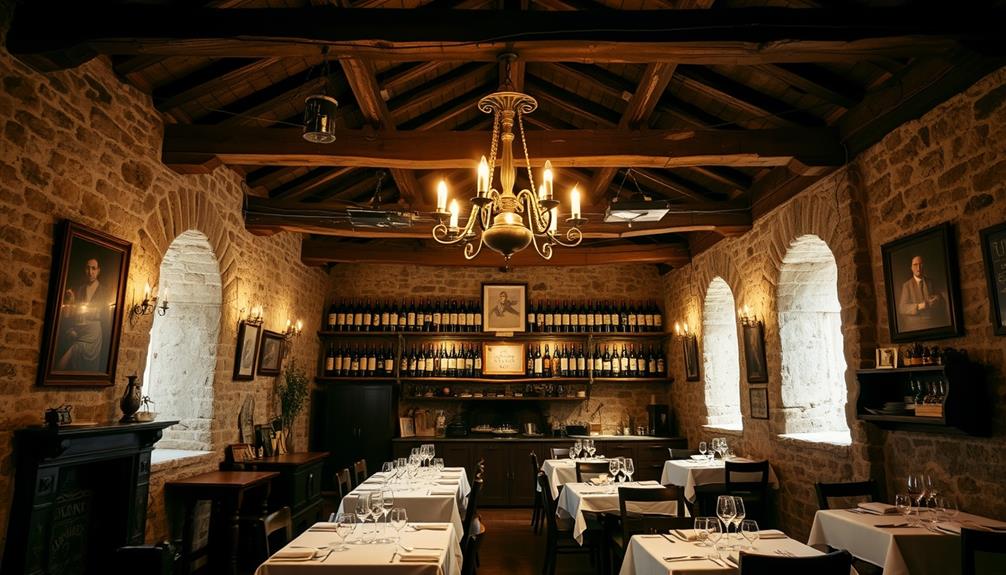To serve alcohol in a restaurant, you've usually got to be at least 18 or 21 years old, depending on your state's regulations. Around 26 states allow individuals as young as 18 to serve alcohol, while 17 require you to be 21. Some specific areas may have stricter rules, so it's crucial to check local laws. Additionally, if you're under 21, you might need training or certification to serve. Understanding these details can help you navigate your opportunities in the restaurant industry, and there's more significant information ahead to guarantee you're fully prepared. When considering a career in serving alcohol, it’s also important to familiarize yourself with the specific rules and regulations of the establishments you are interested in working for. Some may have additional requirements or restrictions, so it’s essential to do your research. Whether you’re looking to serve at a trendy bar, upscale lounge, or one of the top birthday restaurant picks in your area, being well-informed and prepared will set you up for success in the industry.
Key Takeaways
- The legal age to serve alcohol varies by state, typically ranging from 18 to 21 years.
- 26 states allow individuals as young as 18 to serve alcohol, while 17 states mandate a minimum age of 21.
- Local ordinances may impose stricter age requirements, so it's essential to check local laws.
- Some jurisdictions permit those under 21 to serve specific types of alcohol, like beer and wine, under certain conditions.
- Training and certification may be required for individuals under 21 to ensure responsible alcohol service practices.
Legal Age Requirements

When it comes to serving alcohol, age requirements can vary considerably depending on where you are. The legal age to serve alcohol in restaurants generally ranges from 18 to 21 years, influenced by state and local laws. In 26 states, you can start serving at 18, while 17 states impose age restrictions that require servers to be at least 21 years old.
Understanding the common financial terms related to the hospitality industry can also be beneficial, as it may help in managing tips and wages more effectively.
Some jurisdictions even allow those under 21 to serve specific types of alcohol, like beer or wine. However, it's essential to check local regulations, as they might be stricter than state laws. For instance, you may discover that your city has different licensing requirements that might affect your eligibility to serve alcoholic beverages.
Additionally, if you're under 21 and want to serve alcohol, you might need to complete certain training and certification courses in some areas. This training guarantees that you understand responsible serving practices and comply with local laws.
State-Specific Regulations
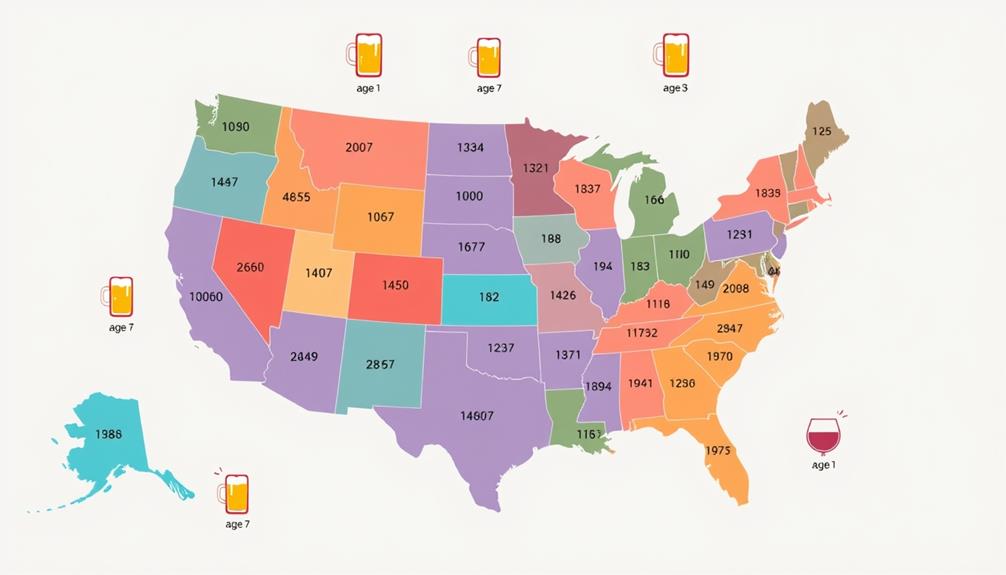
When it comes to serving alcohol, age limits can really vary from state to state.
You might find that local laws impose stricter requirements, or certain areas have unique rules.
Additionally, understanding sector performance metrics related to the restaurant industry can provide insights into how age regulations might affect staffing and service.
It's essential to check your state's regulations and any special licenses needed for serving alcohol in your area.
Varying State Age Limits
The legal age to serve alcohol varies greatly across the United States, with 26 states allowing individuals as young as 18 to take on this responsibility. However, local ordinances can sometimes impose stricter age limits. For instance, in Chicago, despite Illinois state law permitting 18-year-olds to serve, the minimum age is set at 21.
Different states may also have varying requirements based on the type of alcohol served, which affects employment eligibility in restaurants. In Colorado, for example, 18-year-olds can serve alcohol but only under the supervision of a licensed bartender, creating pathways for younger individuals to enter the industry.
Here's a quick look at some age limits:
| State | Minimum Age to Serve Alcohol |
|---|---|
| Illinois | 21 (Chicago) |
| Colorado | 18 (with supervision) |
| California | 18 |
| New York | 18 |
It's essential to consult local regulations, as they can greatly influence the minimum age requirements for serving alcohol in specific jurisdictions. Always check state law and local ordinances before applying for a position that involves serving alcohol.
Local Law Exceptions
Maneuvering local law exceptions can be essential for anyone looking to serve alcohol in various states. While many states set a minimum age limit, local ordinances often impose stricter requirements that you need to be aware of.
Understanding the importance of financial considerations for elderly care is vital, especially when dealing with potential liabilities associated with serving alcohol. For instance, in Texas, you can serve alcohol at 18, but some cities may raise that age limit.
Similarly, Illinois allows those aged 18 to serve, yet in Chicago, you must be at least 21. In California, the general rule is also 18, but if you're working in a venue that mainly sells alcohol, individuals under 21 can't serve at all.
New York has its own unique twist; you can be 18, but you must be supervised by someone who's 21 or older while serving alcohol.
These examples underscore the importance of understanding both state and local government regulations. Always check the specific local laws where you plan to work, as they can greatly impact your ability to serve alcohol.
Ignoring these local ordinances could lead to complications, so staying informed is vital for compliance and success in the restaurant industry.
Special Alcohol Licenses
Maneuvering state-specific regulations for special alcohol licenses is vital if you're aiming to serve alcohol legally. Each state has its own rules about the age required to serve liquor, and understanding these can save you from legal troubles down the line.
It's important to reflect on how developmental factors, such as key domains of development, can influence training and responsibility levels in young servers. Here are some key points to reflect on:
- In Texas, you can serve alcohol at 18 with the right permits, but local laws may set higher age limits.
- Some states allow 16 to 17-year-olds to serve alcohol under supervision or for certain beverages.
- Illinois allows 18-year-olds to serve alcohol, but cities like Chicago enforce a minimum age of 21.
- Always check your local ordinances to guarantee compliance with specific regulations regarding special alcohol licenses.
When applying for a license or an alcohol permit, make certain you meet the age requirements and understand what your responsibilities will be as a server.
Serving Alcohol at 18

If you're 18, you might be eligible to serve alcohol in many states, but it's not as straightforward as it seems.
Local regulations can set the age limit higher, so you'll need to check specific laws in your area. Additionally, some places allow younger servers for beer and wine while restricting spirits, so understanding these nuances is key to your job prospects.
It's important to recognize that just like individuals with Borderline Personality Disorder, who face unique challenges in emotional regulation, different states have their own specific challenges regarding alcohol service laws.
State-Specific Age Regulations
In 26 states, you can legally serve alcohol at just 18 years old, though local regulations might set a higher age limit.
It's vital to understand the specific requirements in your state, as they can vary widely. For instance, while Illinois allows 18-year-olds to serve alcohol, major cities like Chicago may require you to be at least 21.
Additionally, many communities have discussions about age requirements in the context of safety and compliance, similar to how the presence of security systems can deter crime.
Here are some key points to keep in mind about state-specific regulations:
- In Texas, you can serve alcohol at 18 if you've completed a seller/server training course.
- Some states differentiate between types of alcohol; you might serve beer at 18, but spirits could require you to be 21.
- Always check local government websites for the most accurate information on age requirements.
- Remember, even if the state permits serving at 18, local ordinances may have stricter rules.
Understanding the age regulations in your state is important if you're considering a job in the restaurant industry.
Always stay informed, as these requirements can change, and being aware of them helps you avoid any legal issues.
Local Ordinance Variations
Understanding local ordinance variations is vital when you're looking to serve alcohol at 18. While many states allow individuals 18 and older to serve alcohol, local ordinances can impose stricter age requirements. For instance, in Illinois, you can serve alcohol at 18, but in Chicago, you must be at least 21. This variation is important to recognize, as it directly impacts your employment opportunities.
To help clarify these differences, here's a quick overview:
| City/County | Minimum Age to Serve Alcohol |
|---|---|
| Illinois (State) | 18 |
| Chicago (City) | 21 |
| California (State) | 18 |
| San Francisco (City) | 21 |
It's necessary to consult specific city and county laws to determine the legal serving age. Some locations may even allow individuals as young as 16 to serve unopened alcohol in particular contexts. Always make sure you comply with both state and local laws; violations can lead to penalties for you and your establishment. Being informed will help you navigate the complexities of serving alcohol responsibly.
Bartending Age Criteria

Serving alcohol in a bartending role comes with specific age requirements that vary across the United States. Generally, you'll find that most states allow individuals as young as 18 to serve alcohol, while others set the minimum age at 21.
It's vital to know the age requirements in your state and any local ordinances that might affect your eligibility. Additionally, understanding the importance of compliance with local laws can help guarantee a safe and responsible serving environment, especially regarding cold medications overview that may affect your duties during shifts.
Here's a quick overview of what to keep in mind:
- 18 Years Old: 26 states allow bartenders at this age.
- 21 Years Old: 17 states require bartenders to be at least this age.
- Restricted Serving: Some states permit those under 21 to serve specific types of alcohol, like wine, under supervision.
- Bartending License: In many regions, obtaining a bartending license may also depend on age requirements.
Before you apply for a bartending job, check your local regulations to confirm you meet all criteria. Understanding these age requirements and local ordinances is important for compliance, helping you serve alcohol legally and responsibly in your role.
Local Ordinance Variations
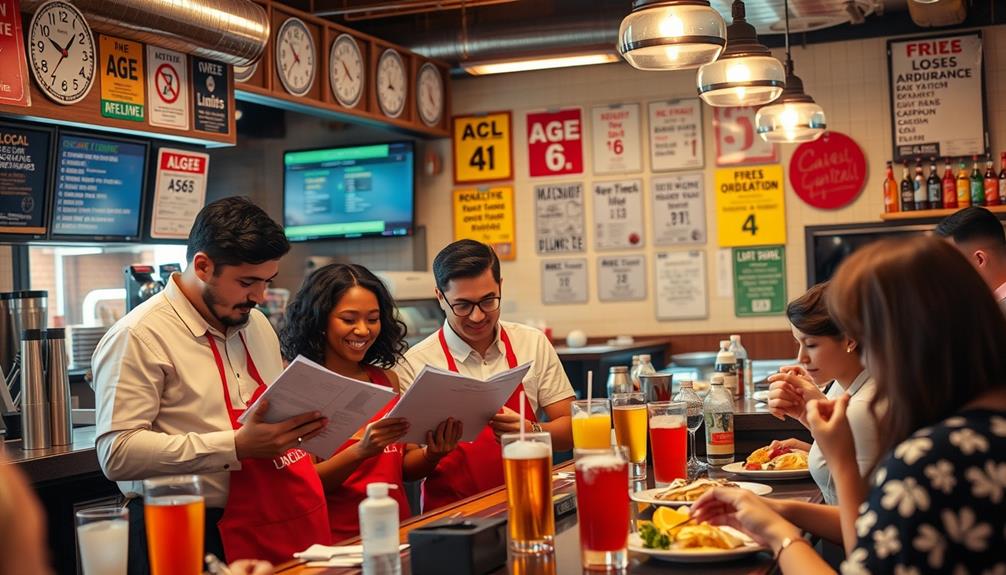
Local ordinances can greatly influence the age at which you can serve alcohol, sometimes imposing stricter rules than state laws. While state laws may allow individuals as young as 18 to serve beer and wine, local ordinances might require all servers to be at least 21.
It's crucial to familiarize yourself with your municipality's regulations, as they can vary considerably. Additionally, certain establishments may have specific policies regarding serving alcohol that align with their overall customer satisfaction ratings and operational standards.
In some areas, you might even find that individuals aged 16 or 17 can serve alcohol, provided they're supervised by an adult. However, this flexibility often comes with additional age requirements or conditions you must meet.
Local ordinances may also stipulate whether you need a permit or training certification to serve alcohol, which can further impact your eligibility.
Before you start working in a restaurant, take the time to research these local regulations. Ensuring you're compliant with the age requirements and any necessary certifications not only protects you but also the establishment where you work.
Ignoring local ordinances can lead to serious consequences, including fines or even the loss of your job. Stay informed to navigate the complexities of serving alcohol legally and responsibly.
Minors and Alcohol Sales

When it comes to minors and alcohol sales, the legal age can vary widely. In certain jurisdictions, laws permit 16-year-olds to sell unopened alcohol, while others enforce stricter regulations.
Understanding these variations is vital for restaurant owners, as it impacts hiring practices and compliance with local laws. Additionally, some companies, like Noble Gold, provide educational resources that can help businesses navigate complex legal environments.
It's important to check your local laws to understand the specific employment restrictions in your area.
Legal Age Variations
Understanding the legal age for serving alcohol can greatly impact your career in the hospitality industry. Depending on where you live, the legal age to serve alcohol in restaurants can vary considerably. Here are some key points to keep in mind:
- In 26 states, individuals as young as 18 can serve alcohol.
- 17 states require servers to be at least 21 years old.
- Some states allow 16-year-olds to sell unopened alcohol in off-premises settings, but they can't serve alcohol directly to customers.
Additionally, understanding the legal process of divorce can provide insights into major life changes that may influence career decisions.
Local regulations may impose stricter age requirements than state laws.
It's essential to familiarize yourself with these legal age requirements, as they can affect your job opportunities and guarantee compliance with the law.
Failure to adhere to local regulations can lead to penalties for both you and your employer.
Always check the specific laws in your area, as they can change and differ from state to state.
Being informed not only helps you in your career but also ensures that you contribute to a responsible and legal service environment in the restaurant industry.
Employment Restrictions for Minors
Minors face significant restrictions when it comes to alcohol sales, which can impact job opportunities in the hospitality industry. In Texas, for example, you must be at least 18 years old to serve alcohol in establishments with a TABC permit.
While some states allow individuals as young as 16 to sell unopened alcohol, you still can't serve alcohol directly to customers. This means if you're between 16 and 19, you might be able to handle off-premises sales, but your role is limited.
It's vital to understand that local regulations can impose stricter age limits. Before pursuing a job in a restaurant or bar, make certain you verify the specific laws in your state and city.
Additionally, some places may require you to complete an alcohol server certification course, even as a minor. Compliance with these employment restrictions for minors is essential to legally operate within the hospitality industry.
Licensing and Permits
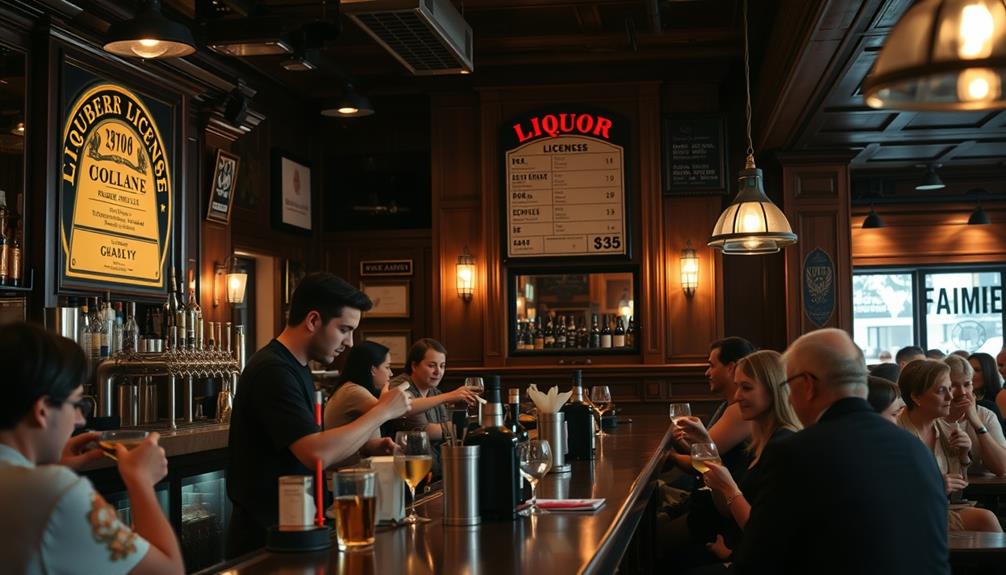
Maneuvering the world of licensing and permits for serving alcohol can be complex, especially with varying state and local laws. Each state has its own requirements that dictate who can serve alcohol in restaurants. In Texas, for instance, you need to be at least 18 years old, although some local jurisdictions may set higher age limits.
To guarantee compliance, here are some important points to take into account:
- Verify the minimum age requirements for your specific location.
- Be aware that some states may mandate training for servers under a certain age.
- Understand that while you might sell unopened alcohol at 16 in some areas, you usually can't handle or serve it directly.
- Employers must guarantee that all employees meet local and state regulations to avoid fines or losing their alcohol license.
Staying informed about these regulations is essential if you want to successfully serve alcohol. Ignoring these licensing requirements can lead to severe consequences for both you and your establishment.
Training for Servers
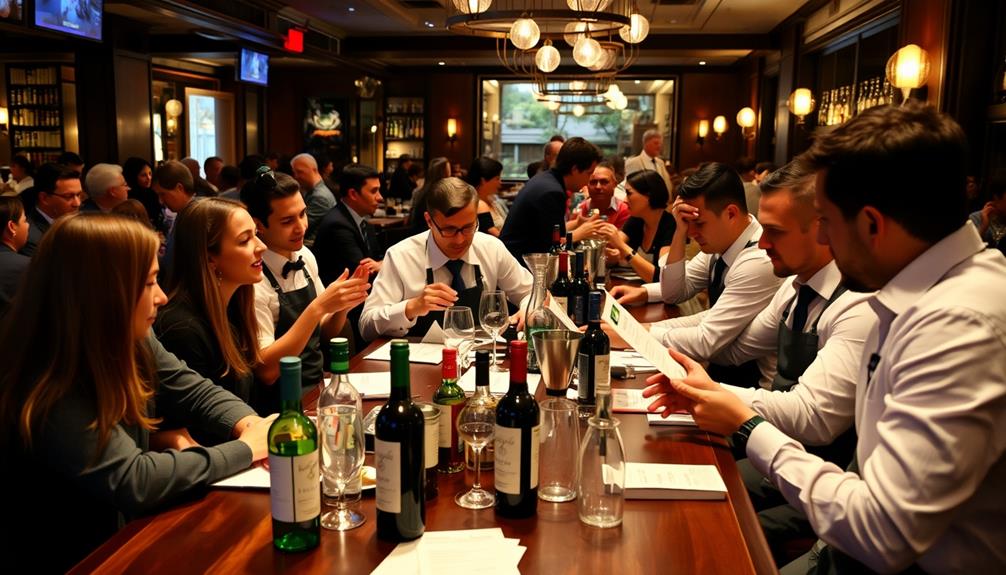
When it comes to serving alcohol, proper training is essential for guaranteeing a safe and compliant environment. In Texas, there's no minimum age requirement for training programs, meaning anyone can participate in the courses designed to prepare server employees. However, remember that to serve alcohol in a restaurant setting, these employees must be at least 18 years old.
Training programs typically cover significant topics like responsible alcohol service, how to identify fake IDs, and recognizing signs of intoxication. This knowledge is important for compliance with state laws and helps you navigate the complexities of alcohol service.
Some states may even require specific certifications or proof of completing training programs before you can serve alcohol, so it's imperative to check your local regulations.
Ongoing training and refreshers are also recommended to keep you updated on any changes in laws and best practices. By investing in proper training, you not only protect your establishment from legal risks but also provide a safer experience for your patrons.
Ultimately, being well-trained makes you a more effective server and contributes to a responsible alcohol service culture in your restaurant.
Enforcement and Compliance
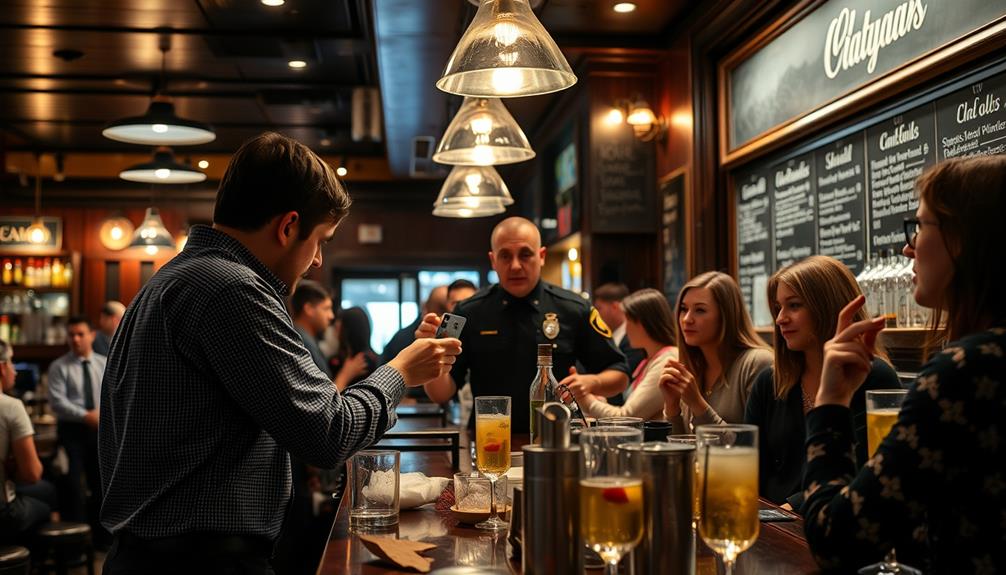
In Texas, strict enforcement of alcohol service laws guarantees that establishments comply with age requirements and regulations. You must be aware that individuals need to be at least 18 years old to serve alcohol in restaurants, but local ordinances might impose stricter rules.
As a result, it's essential for you to verify and adhere to these regulations.
To promote compliance, keep the following in mind:
- TABC agents conduct regular inspections to check adherence to age restrictions.
- Establishments violating these laws may face penalties like fines or license suspension.
- Training in responsible alcohol service is recommended for all employees.
- Always check identification to verify age and prevent underage drinking.
Tips for Employers

Maintaining compliance with alcohol service laws is essential for any establishment, especially when employing younger staff. In Texas, individuals as young as 18 can serve alcohol, but it's vital to verify local ordinances, as some areas may have stricter age limits.
To minimize legal risks, you should provide training for your young employees on responsible alcohol service and compliance with alcohol laws. This training should cover not only the legal age requirements but also the importance of checking IDs and understanding the consequences of serving alcohol to underage customers.
Ensure all employees serving alcohol have the necessary permits, if required, and that they're well-informed about your company policies.
Regular staff training sessions on alcohol service laws can reinforce this knowledge and promote responsible service among younger employees.
Frequently Asked Questions
At What Age Can You Serve Alcohol in Texas?
In Texas, you can serve alcohol at 18. You'll need to work under someone older, and it's smart to check local laws, as some cities might have stricter age requirements for serving alcohol.
Can You Bartend at 18 in Texas?
Like a young Gatsby pursuing the American Dream, you can indeed bartend at 18 in Texas. Just make certain you're legally allowed, and you'll mix drinks and create memorable experiences for your patrons.
How Old Do You Have to Be to Serve Alcohol in GA?
In Georgia, you can serve beer and wine at 18, but you need to be 21 to sell distilled spirits. Remember, local laws might vary, so always check your area's regulations before starting.
Can Your Parents Buy You Alcohol at a Restaurant in Texas?
Imagine sitting at a restaurant, the aroma of delicious food wafting around you. Your parents can't buy you alcohol here, though; Texas law prohibits minors from consuming it in public, no matter the circumstance.
Conclusion
In summary, knowing the legal age to serve alcohol in a restaurant is vital for compliance and success. Did you know that about 60% of states allow 18-year-olds to serve alcohol, but with varying restrictions? It's important to stay updated on local laws and make sure your staff is properly trained. By understanding these regulations, you not only protect your business but also create a safer environment for your patrons. Keep your team informed and compliant!


